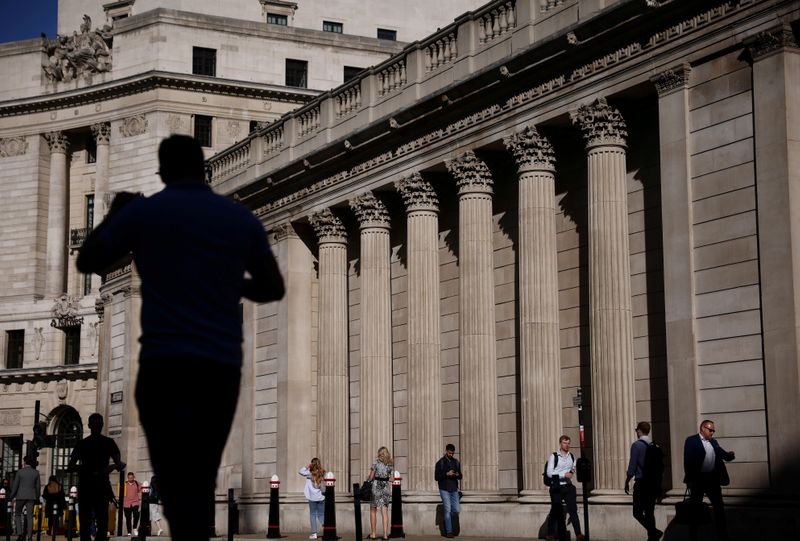Bank of England to raise rates in late 2022, possibly sooner
© Reuters. FILE PHOTO: People walk past the Bank of England during morning rush hour, amid the coronavirus disease (COVID-19) pandemic in London, Britain, July 29, 2021. REUTERS/Henry Nicholls/File Photo By Jonathan Cable
LONDON (Reuters) – The Bank of England will raise borrowing costs by end-2022, earlier than previously thought, and there is a chance it comes even sooner as a solid economic recovery from the pandemic and high inflation may tip its hand, a Reuters poll found.
Like central banks across the world, the BoE slashed borrowing costs at the height of the coronavirus pandemic and also restarted its quantitative easing programme. But as daily deaths from COVID-19 have fallen thanks to extensive vaccination, much of life in Britain has returned to normal.
Bank Rate was seen rising to 0.25% in the fourth quarter of 2022 from its current record low of 0.10%, according to the Sept. 6-9 poll. In an August poll no change was expected until 2023.
Such a move would put the BoE ahead of the U.S. Federal Reserve, which is not forecast to raise interest rates until 2023, although the Fed is expected to announce a plan to taper its asset purchases this month, a separate Reuters poll found. [ECILT/US]
And when asked if the risk was that first hike from the BoE came earlier or later than expected, over 80% of respondents to an extra question said sooner.
“Despite persisting COVID-19 uncertainties and severe global supply-side dislocations which will temporarily restrain real output growth, the overarching narrative for the UK – as part of a broader advanced world story – is decidedly positive,” said Kallum Pickering at Berenberg.
“Healthy fundamentals and a renewed confidence in policymakers’ abilities to stimulate demand will see to that.” (Graphic: Reuters poll graphics on UK economy and the Bank of England’s policy outlook: https://fingfx.thomsonreuters.com/gfx/polling/jnvweeqldvw/UK%20LT.png)
Policymakers were evenly split last month between those who felt the minimum conditions for considering an interest rate hike had been met and those who thought the recovery was not strong enough, BoE Governor Andrew Bailey said on Wednesday.
Bailey said he was among officials who thought the minimum conditions had been reached, but they were not yet sufficient to justify a hike as Britain’s economy continued to recover from its nearly 10% pandemic crash in 2020.
INFLATION RISING
With most of Britain now reopened, thanks in large part to a mass vaccination drive, the economy was expected to expand 2.5% this quarter and 1.5% next, little changed from last month.
On an annual basis, medians in the poll of 56 economists put growth this year at 6.8% – unchanged from last month – and at 5.5% in 2022, a tad better than the previous 5.4% forecast. (Graphic: Reuters poll graphics on the UK inflation, monetary policy and economic growth outlook: https://fingfx.thomsonreuters.com/gfx/polling/gdvzyyzngpw/UK%20LT%20economy%20chart.png)
But when asked how the risks to their outlook was skewed, 60% said it was to the downside rather than the upside.
“The COVID-19 and Brexit shocks were blurred together, and as COVID-19 gradually affects the economy less and less, Brexit scarring will become increasingly apparent,” said James Rossiter at TD Securities. “Structural adjustments due to Brexit have yet to fully reveal themselves.”
Britain has suffered massive supply chain disruptions caused by the pandemic, like the rest of the world, but they have been exacerbated by its exit from the European Union, which has wrought border disruptions and delays as well as a shortage of European labour.
Those disruptions have driven up prices. Inflation did fall to the Bank’s 2.0% target in July but economists have said that was most likely a blip and the poll forecast it to average 2.6% this quarter, 3.5% next and 3.4% in early 2022.
Meanwhile, British employers are facing the most severe shortage of job candidates on record due to the post-lockdown surge in the economy as well as Brexit, pushing up starting pay for permanent staff at an unprecedented pace, a recruiters’ body said on Thursday.
Unemployment was seen averaging 4.9% this year and 4.7% in 2022.
(For other stories from the Reuters global economic poll)












 Bitcoin
Bitcoin  Ethereum
Ethereum  Tether
Tether  XRP
XRP  USDC
USDC  Solana
Solana  TRON
TRON  Figure Heloc
Figure Heloc  Lido Staked Ether
Lido Staked Ether